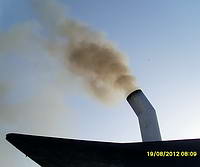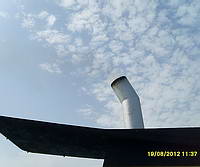short technical proposal We
offer install on your ship - the system of pretreatment ship's
fuel (save ship's fuel) - PSSF (pretreatment system of ship
fuel) produced by BIMONT d.o.o. (SLO), which
would provide the following results:
1. An increase
speed of fuel combustion in engines and boilers, which will
reduce harmful emissions and the amount of smoke up to 20%,
reduce specific fuel consumption and provide fuel economy from
2% to 4%.
2. Reduced viscosity of the fuel to 15%, it can use the cheaper
fuels.
3. An increase engine life for separator and engine in 2 times,
which reduces the amount of particulate Al, Si up to 30%, and
reducing the amount of coke in the treated fuel to 40%
4. Reducing the amount of fuel that cast separator to sluge
tank up to 95%.
5. Reduction size and quantity of particles of aluminum and
silicon in the sediment residual ship's fuel RME 180
The
main difference PSSF :
= high reliability, long-term effective work with heavy fuel
oil, high-quality processing of different fuels.
= possibility of execution scheduled operations by ship's crew
without calling customer service.
= experience of successful exploitation for 5 years and the
presence of positive objective analysis and testing.
Evidentiary facts
1. Reliability
- before we offered you a system PSSF, we tested it practically
to the territories of Russia, Ukraine, Belarus, Syria, in continuous
operation for 2-3 years with heavy fuel oils, in conditions
of poor filtration of high viscosity and content of abrasive
particles, resins , asphaltene suspension. www.afuelsystems.com/ru/trga/trga-mz.html
This experience
was used to create ship's equipment. The similar German equipment
breaks down after 3-4 months and can not be serviced through
a crew on board. (on request will send a complete description
of the German ship homogenizing, including passport and prices).
2. The reliability of ship's version of PSSF is confirmed in
practice.
The first
module was installed on buffer tank 28.11.2011
www.afuelsystems.com/ru/trga/s97.html
and worked until August 2012, when it was turned off for our
new tests. And then worked again and again until April 2013
until the ship was stopped for repairs.
|
|
|
 The result
of using the module to a buffer tank -
The result
of using the module to a buffer tank -
the use of ship's fuel higher viscosity
fuel economy and reduced smoke
|
|
|
|
|
|
Official Report Transeuropa Shipping Lines DOO
|
|
 |
 |
3. Certification
and Warranty - www.energy-saving-technology.com/ru/sertif-garant.html
We have real
systems for save ship's fuel and :
1. Certificate
of Maritime Register of Ukraine - the right of using
the homogenizer TRGA on ships.www.afuelsystems.com/foto/sert/SVID_TRGA_T1.jpg
2. EU quality certificate number 2042 - www.afuelsystems.com/ru/trga/s76.html
3. Permission from RTN ( Russian Technical Supervision
(Russian standard)) for use homogenizer TRGA in any critical to
safety industrial objects of Russia, Belarus, Kazakhstan www.afuelsystems.com/ru/trga/s123.html
4.
Company Bemont - our partner in Slovenia - has all certificates
from Germanischer Lloyd for the right to execute any
repair and installation work on ships - www.afuelsystems.com/ru/trga/s120.html
5. We guarantee
and provide certification of Germanischer Lloyd for each individual
installation on your ship.
7. CRS
marine certificate.
5.
The payback period of the system.
Takes into
account only the direct economy of fuel, ( 4% ) and the cost of
fuel IFO 180 "on the beach" (Belgium, Ostend, August
2012), the payback period of PSSF, to test ship, was 96 days.
We did not take into
account such factors as - save when you buy more viscous fuel,
savings from reducing the cost of utilization sludge, savings
while increasing engine life the separator and the ship engine.
conclusion:
Homogenizers
TRGA series have proven their reliability and efficiency when
working with heavy and polluted fuels can be successfully used
for the pretreatment of ship fuels to its economy, reduce smoke,
reduce emissions, reduce fuel loss with slurry and increasing
resource diesel marine engines. Homogenizer TRGA works on the
principle of "Run-and-forget" and are maintenance-free
for at least 10 months.
If the ship
is equipped with steam power boiler - that this problem is solved
by homogenizer TRGA long and brilliantly proved on more than 100
units from 2007. Some of the illustrations, the analyzes below. |
|
|
|
work ship's
engine with standard HFO
(IFO 180) fuel
|
engine
work at the same HFO fuel,
which is processed by technology PSSF |
|
|
|
work
of a similar ship's engine
on a standard HFO fuel
|
work
of the same engine with the exactly same HFO fuel
which is processed by the system PSSF |
two
identical spacecraft, from one company,
use the same fuel on a collision course - channel La Manche |
|
|
|
6.
Scientific objectivity.
The following analyzes of ship's residual on fuel RME 180 Croatia
Rijeka refinery production, concern INA. Tests performed at the
refinery. Comparative results table.
Without the
use of additives
- The viscosity of fuel is reduced from 138.5 cc to 117.6 ccc
- The number of coke particles is reduced from 6.14 to 8.18 m
/ m
- Amount of free Va reduced from 125 to 120 mg / kg
- Pour point was reduced from 30 to 24 degrees
Furthermore, we offer effective additives that reduce
the filterability limit temperature of from " -8
-10" up to "-25-28 " degrees Celsius. Technology
mixing fuel with the additives without
preheating.
|
|
 |
Below the
analyzes of ship's fuel RME 180 to assess the impact of the system
PSSF the size and number of particles of aluminum and silicon
- Laboratory INA Zagreb Croatia. Reducing the amount of particulate
by 38% without adding any additives.
A quote from
the official report -
" Samples" 0 "and"
2 "are very similar, and a sample of" 5 "is macroscopically
different (lighter cake). Samples "0" has a lot of residue
on the filter paper (impurities) in the sample "2" a
little smaller than the amount of impurities in the sample "5",
these impurities do not exist practically. Visible only clean
filter paper in which the visible random particles.
For comparison, all samples have been
taken to increase X 500. Samples "0" and "2"
have a particle size of about 5 to 10 microns to 20 microns rarely.
They are found several clusters (sizes from 10 to 30 microns)
Sample "5" is different from the others. It has a much
smaller particle size and smaller volume (particle size approximately
from 1 to 5 microns) "
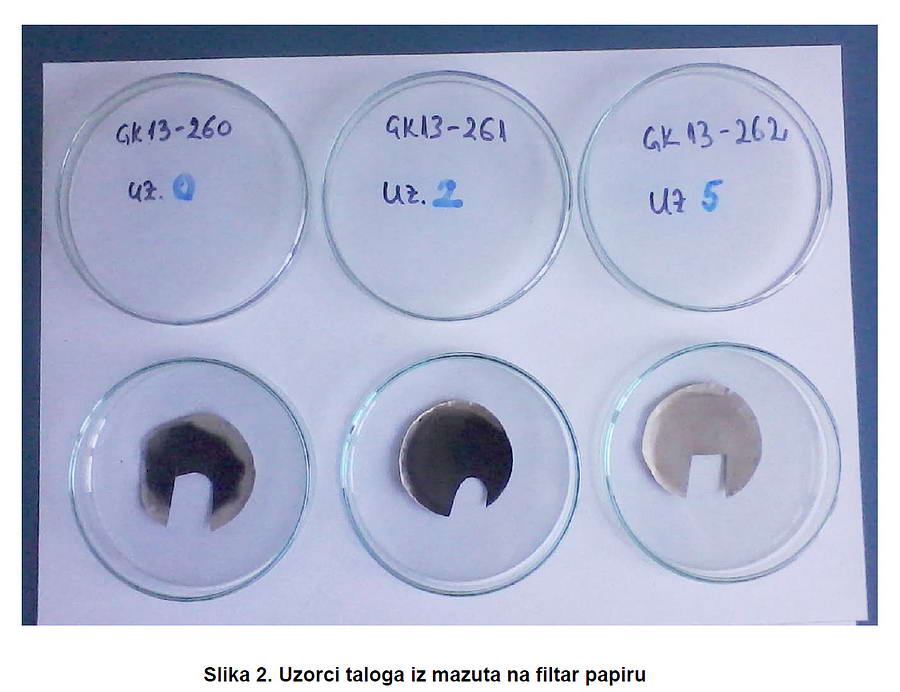
|
|

Photos of
the particles of aluminum ( Al ) and silicon ( Si) in the sediment residual
ship's fuel RME 180
(Analysis - April 2013 concern INA, Zagreb) before and after treatment
lower photo shows the only fiber filter ..
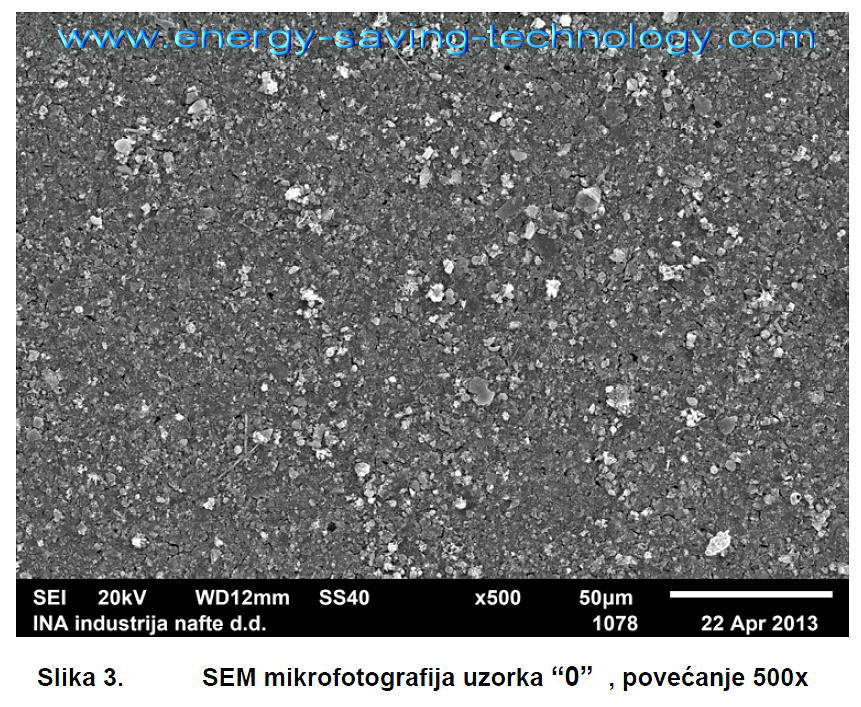
reduction
size and quantity of particles of aluminum and silicon
in the sediment residual ship's fuel RME 180
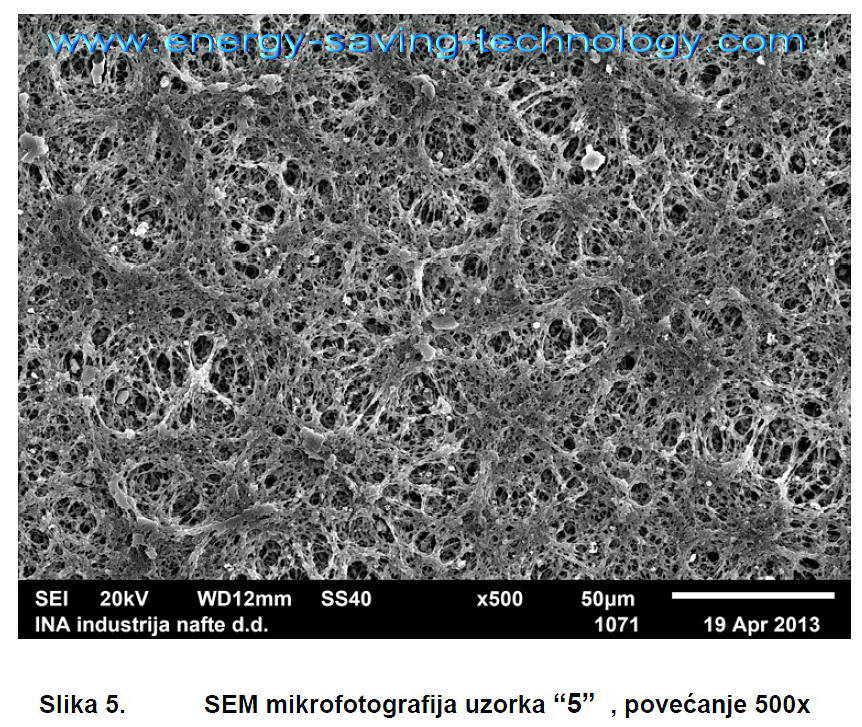
|
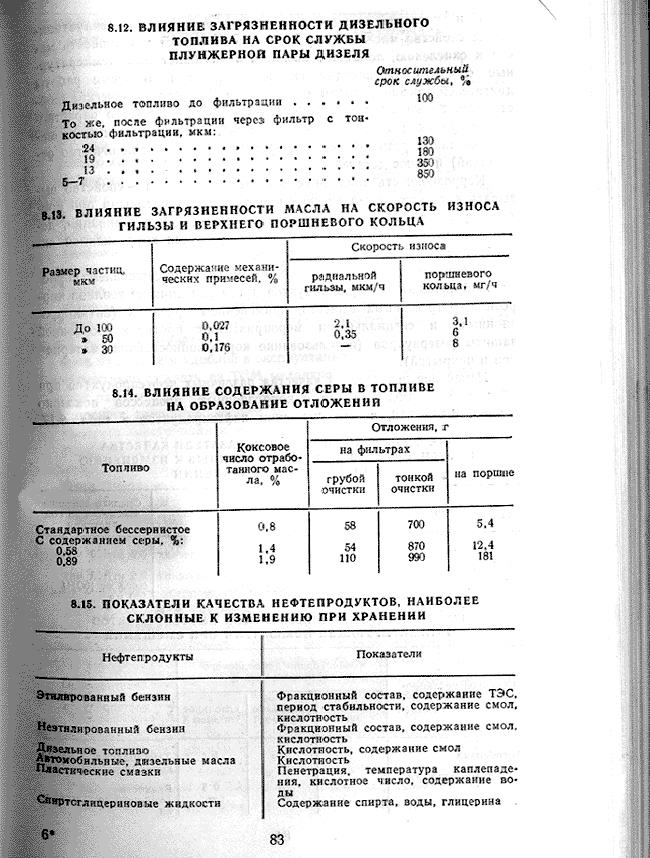 |
According to the " manual on fuel and lubricants "
reduce particle size range from 13-19 to 5-7 microns increases
the service life of diesel engine is 2.5 times the system
PSSF reduces the particle size to the range of 1-5 microns.
|
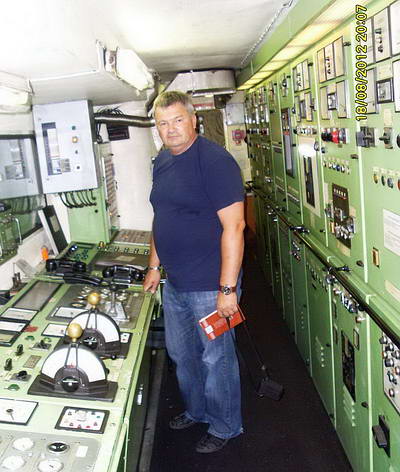 this equipment manufacture, test, install,
this equipment manufacture, test, install,
and sell ourselves. |
|
fuel system PSSF - reduction ratio on fuel illustratively
shipboard fuel IFO 180 - before and after treatment.

Below - processing
the results of fuel
as coal tar pitch and water-coal fuel
Before and after treatment
( illustration of extent of treatment )
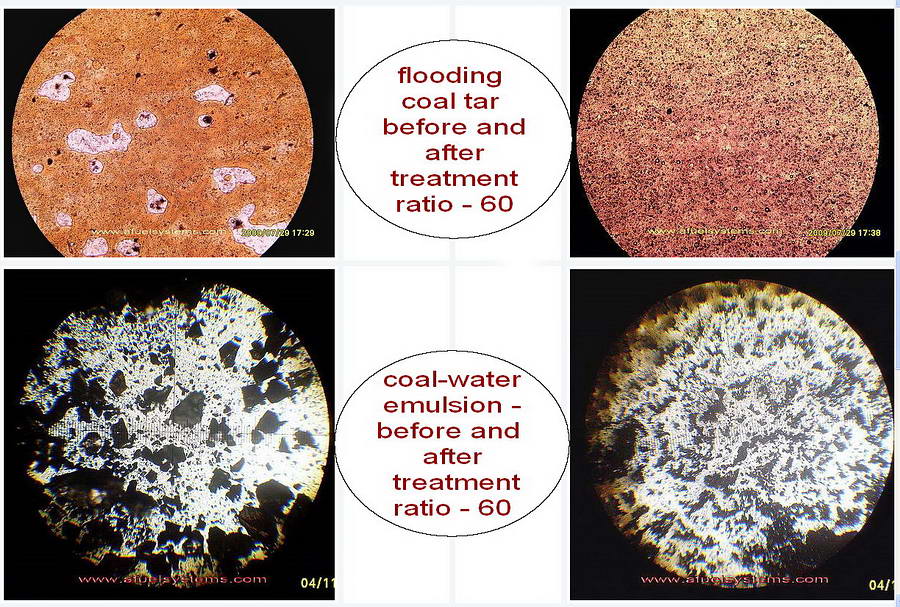
|
All the results of analyzes ship's fuel and the results of the testing
are available in the original contacts with companies and organizations
that produce them, namely:
1. Refinery Rijeka, Croatia, concern INA.
2. Central Research Laboratory of concern INA, Zagreb Croatia.
3. Research Laboratory, PETROL, Ljubljana, Slovenia.
4. Research Laboratory of the company RACI, Ljubljana, Slovenia.
It's very serious ... IACS
marine TYPE APPROVAL Certificate
The offer will be sent after filling out
a questionnaire.
|
|
| All
pictures taken on objects are installed units series TRGA-3G.
Authors of photos. Andrey Ruban. Yusuf Bashal,
Igor Trosht, Laboratory INA Croatia Zagreb, Croatia Rijeka
Refinery Laboratory. |
|
|
|
